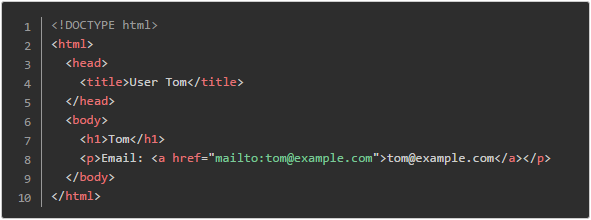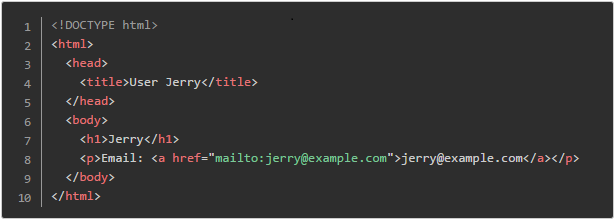Problem Description
Chengcheng is building a website recently. Some of the contents of the pages come from different data records in the database, but the basic structure of the pages is the same. For example, for a page showing user information, when the user is Tom, the source code of the page is

When the user is Jerry, the source code of the web page is

There are many examples of this in websites with dynamic content. In order to simplify the work of generating web pages, Cheng felt that he needed to introduce a template generation system.
Templates are text containing special tags. The template used for generation contains only one special tag in the format {VAR}, where VAR is a variable. This tag is replaced by the value of the variable VAR when the template is generated. For example, if the variable name = Tom, then {{name}} generates Tom. The specific rules are as follows:
· Variable names are composed of upper and lower case letters, numbers and underscores (), and the first character is not a number and is not longer than 16 characters.
· Variable names are case sensitive, and Name and name are two different variables.
· The value of a variable is a string.
· If the variable in the tag is undefined, an empty string is generated, which is equivalent to deleting the tag from the template.
· Templates are not generated recursively. That is to say, if the value of a variable contains something like {VAR}, no further substitution will be made.

When the user is Jerry, the source code of the web page is

There are many examples of this in websites with dynamic content. In order to simplify the work of generating web pages, Cheng felt that he needed to introduce a template generation system.
Templates are text containing special tags. The template used for generation contains only one special tag in the format {VAR}, where VAR is a variable. This tag is replaced by the value of the variable VAR when the template is generated. For example, if the variable name = Tom, then {{name}} generates Tom. The specific rules are as follows:
· Variable names are composed of upper and lower case letters, numbers and underscores (), and the first character is not a number and is not longer than 16 characters.
· Variable names are case sensitive, and Name and name are two different variables.
· The value of a variable is a string.
· If the variable in the tag is undefined, an empty string is generated, which is equivalent to deleting the tag from the template.
· Templates are not generated recursively. That is to say, if the value of a variable contains something like {VAR}, no further substitution will be made.
Input format
The first line of input contains two integers m and n, representing the number of rows of the template and the number of variables given when the template is generated.
Next m lines, each line is a string representing the template.
Next n rows, each representing a variable and its value, separated by a space. Values are strings enclosed in double quotation marks ("), which can contain any printable ASCII characters other than double quotation marks (ASCII code range 32, 33, 35-126).
Next m lines, each line is a string representing the template.
Next n rows, each representing a variable and its value, separated by a space. Values are strings enclosed in double quotation marks ("), which can contain any printable ASCII characters other than double quotation marks (ASCII code range 32, 33, 35-126).
Output format
The output contains rows representing the results generated by the template.
sample input
11 2
<!DOCTYPE html>
<html>
<head>
<title>User {{ name }}</title>
</head>
<body>
<h1>{{ name }}</h1>
<p>Email: <a href="mailto:{{ email }}">{{ email }}</a></p>
<p>Address: {{ address }}</p>
</body>
</html>
name "David Beckham"
email "david@beckham.com"
<!DOCTYPE html>
<html>
<head>
<title>User {{ name }}</title>
</head>
<body>
<h1>{{ name }}</h1>
<p>Email: <a href="mailto:{{ email }}">{{ email }}</a></p>
<p>Address: {{ address }}</p>
</body>
</html>
name "David Beckham"
email "david@beckham.com"
sample output
<!DOCTYPE html>
<html>
<head>
<title>User David Beckham</title>
</head>
<body>
<h1>David Beckham</h1>
<p>Email: <a href="mailto:david@beckham.com">david@beckham.com</a></p>
<p>Address: </p>
</body>
</html>
<html>
<head>
<title>User David Beckham</title>
</head>
<body>
<h1>David Beckham</h1>
<p>Email: <a href="mailto:david@beckham.com">david@beckham.com</a></p>
<p>Address: </p>
</body>
</html>
Assessment of use case size and conventions
0 ≤ m ≤ 100
0 ≤ n ≤ 100
The input template does not exceed 80 characters per line (excluding newline characters).
Input ensures that all substrings in the template starting with {are legitimate markers, starting with two left braces and a space, followed by variable names, ending with a space and two right braces.
The value string length of all variables in the input does not exceed 100 characters (excluding double quotation marks).
Ensure that the names of all variables entered are different.
0 ≤ n ≤ 100
The input template does not exceed 80 characters per line (excluding newline characters).
Input ensures that all substrings in the template starting with {are legitimate markers, starting with two left braces and a space, followed by variable names, ending with a space and two right braces.
The value string length of all variables in the input does not exceed 100 characters (excluding double quotation marks).
Ensure that the names of all variables entered are different.
#include<iostream>
#include<cstring>
#include<vector>
using namespace std;
struct mde{
string var;
string key;
};
string mode[100];
vector<mde> modes;
vector< vector<int> > change;
vector<int> two(2);
int main(){
int m,n;
int i,j,p;
int loc,locl,locr;
string k,v2,temp;
string sl="{{ ",sr=" }}";
cin>>m>>n;
string s1,s2,s3,v;
getchar();
for(i=0;i<m;i++){
getline(cin,mode[i]);//try scanf
}
mde X;
for(i=0;i<n;i++){
getline(cin,v);
loc=v.find("\"");
k=v.substr(0,loc-1);
v2=v.substr(loc+1,v.length()-loc-2);
X.var=v2;
X.key=k;
modes.push_back(X);
}
for(i=0;i<m;i++){//Line i
temp=mode[i];
while(strstr(temp.c_str(),sl.c_str())!=NULL&&strstr(temp.c_str(),sr.c_str())!=NULL){
int l=0;
int r=0;
//Look for the left first.
l=temp.find("{{ ");
//Find the left and the first right.
r=temp.find(" }}",l);
int len=r-l-3;
s1=temp.substr(0,l);
s2=temp.substr(l+3,len);
s3=temp.substr(r+3,temp.length()-r-3);
for(j=0;j<n;j++){//Find something to replace
if(strcmp(s2.c_str(),modes[j].key.c_str())==0){
two[0]=j;//Record the location of the VAR to be replaced in the VAR vector
two[1]=l;//Record the starting position to be replaced
change.push_back(two);
break;
}
}
temp=s1+s3;
}
for(int p=0;p<change.size();p++){
temp=temp.replace(change[p][1],0,modes[change[p][0]].var);
for(int q=p+1;q<change.size();q++){
change[q][1]+=strlen(modes[change[p][0]].var.c_str());
}
}
mode[i]=temp;
change.clear();
}
for(i=0;i<m;i++){
cout<<mode[i]<<endl;
}
return 0;
}